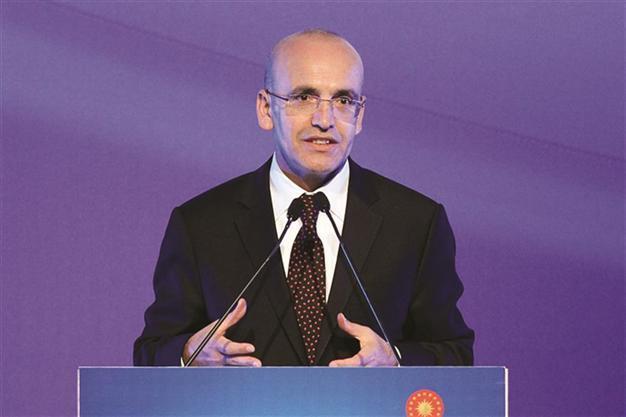Turkey's firm budget performance raises hopes for year-end
ANKARA

Turkish Finance Minister Mehmet Şimşek speaks at a forum in this file photo. The privatization receipts and better tax collection thanks to pick-up in the domestic demand had affected the positive performance, he has said. AA photo
Turkey’s year-end budget deficit will come in below the 34 billion Turkish Liras ($16.8 billion) currently forecast by the government, the finance minister said Sept.16, after the announcement of bright budget data driven by higher tax and privatization revenues.
“The budget has displayed a strong performance and recorvded 231 million liras of surplus and 38 billion liras non-interest surplus. This realization has proved ‘the election budget will be implemented and the budget deficit will rise’ speculations are baseless,” Turkish Finance Minister Mehmet Şimşek said.
The budget income of the country rose 17.9 percent in the January-August period compared to the same period last year, and reached 260 billion liras, while the budget spending increased with a smaller rate of 13.4 percent, realizing at 259.7 billion liras.
“The privatization receipts and better import and consumption tax collection thanks to pick-up in the domestic demand had affected the positive performance,” Şimşek has said in the public statement.
In this period, the privatization revenues doubled the government’s target for the eight months and came in at 8.3 billion liras. Some 87 tenders were conducted between January and July by the Privatization Authority (ÖİB), while agreements were signed for privatizations worth 15.1 billion liras during the same period, according to privatization regulator.
Meanwhile, the government raised the value-added tax it collected by 29.6 percent, special consumption tax by 24.1 percent and in-house VAT by 22.4 percent.
Public spending drives growthIn its statement, the minister also said the public spending was deliberately used in advance to revive the domestic demand and accelerate the economic growth. “The growth rate announced last week confirms this as well,” he said. Turkey’s third quarter growth rate has been revealed as 4.4 percent last week, mainly driven by the domestic demand and government spending.
“Despite there is a possibility that the public spending might accelarate in the rest of the year due to double elections to be held within next year, we should note that the risks of budget deficit’s ratio to national income to come above 2.2 percent of middle term program forecast is downwards,” Burgan Investment chief Economist Haluk Bürümekçi said. Turkey will face two elections within next year, as local elections will take place in Marck and presidential elctions will in August.
